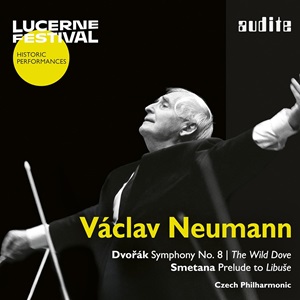
Václav Neumann (conductor)
Antonín Dvořák (1841-1904)
Symphony No 8 in G major, Op 88, B163 (1889)
The Wild Dove, Op 110, B198 (1896)
Bedřich Smetana (1824-1884)
Prelude to Libuše (1871-72)
Czech Philharmonic Orchestra
rec. live, August 1984 (Wild Dove, Libuše) and March 1988 (Symphony), Kunsthaus, Lucerne, Switzerland
Lucerne Festival Historic Performances, Vol 20
Audite 97832 [64]
Václav Neumann recorded two complete cycles of the Dvořák symphonies. The first, from 1971-73, can be found on Supraphon SU4090-2, an 8-CD box of his analogue recordings which also includes orchestral works, including The Wild Dove. His digital remake of the symphonies from the 1980s was made at around the same time that he and the Czech Philharmonic made visits to the Lucerne Festival, two examples of which are presented in Audite’s release. The orchestra appeared on consecutive evenings in August 1984, from which we hear The Wild Dove and the Prelude to Libuše. Then, from 26 March 1988, comes the Symphony No 8.
Neumann’s earlier cycle is by common critical consent the superior, and with sonics to match. However, he remained a superior interpreter of Dvořák’s symphonies and this live Lucerne recording suffers little in comparison with his commercial recordings. The Czech strings are warmly textured and the winds are, as ever, characterful, Neumann unfolding the symphonic argument with natural pacing and judicious orchestral weight, whilst allowing wind counter-melodies room to breathe and phrase. Those nuanced wind choirs make their mark again in the slow movement where he cultivates a natural gravity without any over-emphasis and in the Scherzo there’s elegance as well as charm. Nothing is underplayed, though – full measure is given to the folkloric elements in the music, but they’re not exaggerated. If Neumann is sometimes seen as a middle-of-the-road conductor, maybe that’s because he was seldom prone to exaggerations of tempi, rubati or dynamics. The brass has its moment in the finale where the ‘village band’ sonorities are splendidly put across and the slow section is well integrated. This is recognisably the Neumann of the recorded legacy, less febrile than the Eighth of his great predecessor Václav Talich, though broadly similar to Kubelík, but even more to Otmar Suitner in his excellent Staatskapelle Berlin cycle.
Michael Struck-Schloen’s booklet notes, finely translated by Viola Scheffel, strike a rather militant position regarding Talich’s recording of The Wild Dove, which he claims ‘exaggerates the effect of mourning and exuberance’ in this vivid tone poem, based on a story by Karel Jaromír Erben. I can’t agree, not least in Talich’s 1954 live performance, which is only a minute fleeter than Neumann’s, but that’s a side issue. I will agree that Neumann’s reading is cogent and resourceful, that it marshals the music’s various incidents well, from the glowering opening Andante section through the village wind band thence to the darker sonorities of the ensuing sections where the music’s tragic implications are finally played out. The disc ends with Smetana’s Prelude to Libuše, his great national opera where the brass is on excellent form in its opening peroration and things continue in similar vein, the Czech Philharmonic proving redoubtable ambassadors for its country’s music.
The main question, though, is the Eighth Symphony. If you have the earlier symphonic cycle it will be of documentary interest only and if you have that box you’ll also have the tone poems. Neumann was generally a consistent artist and there are minimal discrepancies between his performances – the differences tend to focus on the sound quality of his recordings. Nevertheless, this is an attractive example of his art and is heard in fine sound.
Jonathan Woolf
Buying this recording via a link below generates revenue for MWI and helps us keep free access to the site



















